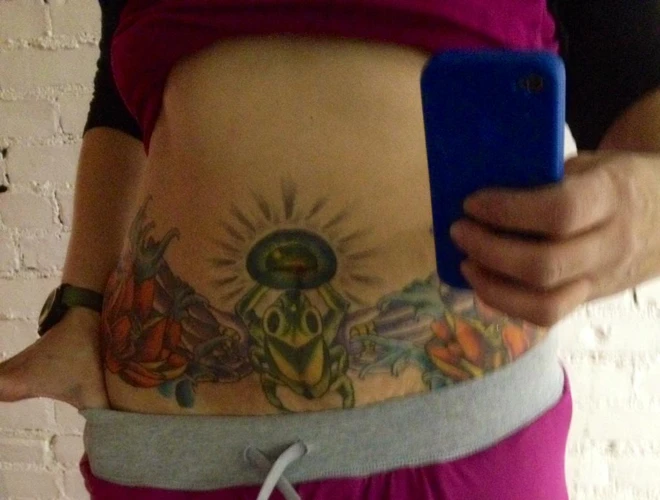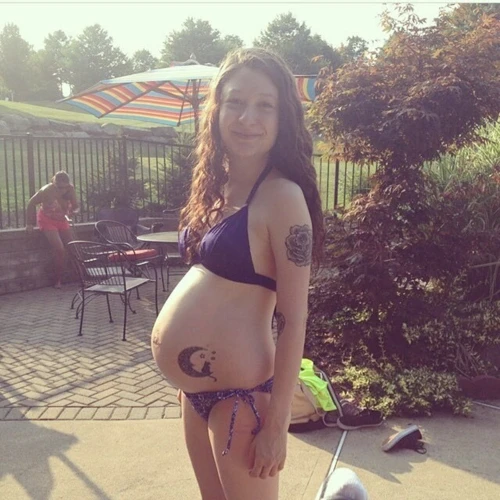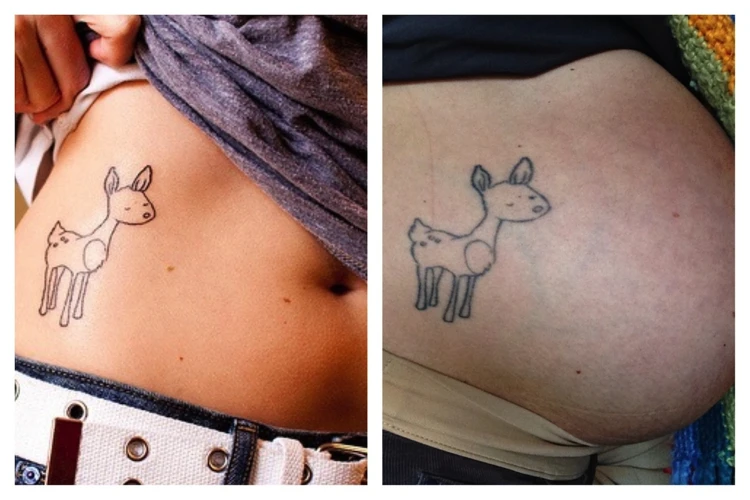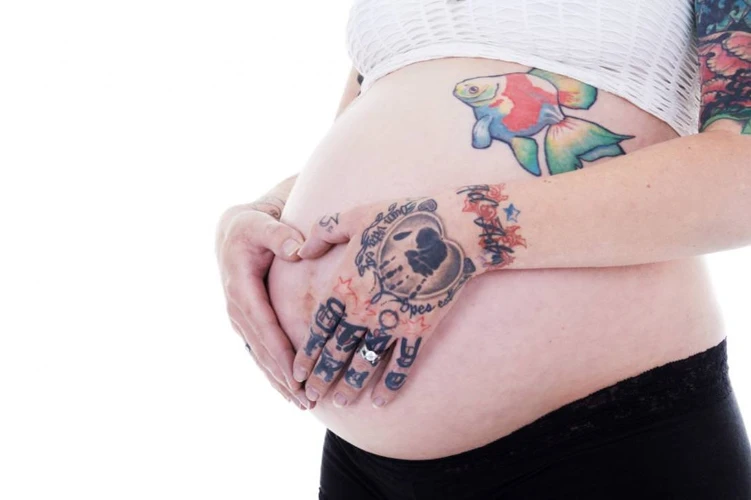Are you wondering what happens to stomach tattoos after pregnancy? Have you noticed changes to your stomach tattoo after pregnancy? Many women experience changes to their stomach tattoos after giving birth. This article will explore the potential impacts of pregnancy on a stomach tattoo, as well as provide advice on how to best care for a stomach tattoo during pregnancy.
Contents
Understanding Stomach Tattoos

Stomach tattoos are a popular choice for many people, providing an opportunity to express a personal sense of style and creativity. They come in a variety of shapes and sizes, from small and intricate designs to large pieces that span the entire stomach area. People often wonder if their stomach tattoos will stretch when pregnant, and the answer is that it depends on the individual’s body and the type of tattoo.
Tattoo Placement: When considering a stomach tattoo, it’s important to think about how it will look when pregnant. If the tattoo is placed on the lower abdomen, it may be more likely to stretch and distort than if it is placed higher on the torso.
Tattoo Size: Larger tattoos are more likely to stretch than smaller ones. Tattoos that cover large portions of the stomach may become distorted or stretched during pregnancy. It is important to consider the size of the tattoo when deciding whether it is a good choice for your body.
Tattoo Ink: Different types of inks may react differently to pregnancy. Some may be more likely to stretch and fade, while others may hold up better. It is important to talk to your tattoo artist about the best type of ink for your stomach tattoo.
Tattoo Care: Proper care of your tattoo is essential to prevent it from stretching or fading during pregnancy. Keep the area clean, moisturize regularly, and avoid direct sunlight and heavy physical activity.
Will Stomach Tattoos Stretch When Pregnant? The answer is that it depends on the individual’s body and the type of tattoo. While some tattoos may stretch, others may not. It is important to consider the placement, size, and type of ink when deciding whether to get a stomach tattoo. Additionally, proper care of the tattoo is essential to prevent stretching or fading.
Effects of Pregnancy on Stomach Tattoos

Stomach Tattoos Stretching
The most common question asked by women with stomach tattoos is “Will my belly tattoo stretch when pregnant?”. The answer is yes. As your belly grows during pregnancy, your skin will stretch, and your stomach tattoo will expand with it. This can cause the design to lose its crispness, blur, and distort.
Changes in Skin Tone
In addition to stretching, pregnancy can also cause your skin tone to change. This can affect the overall look of your stomach tattoo, making it appear darker or lighter than it did before. The changes in skin pigmentation are caused by hormones in the body, and are usually temporary.
Preventing Stretching When Pregnant

Pregnant women who have or are considering getting a stomach tattoo should take certain precautions to prevent the tattoo from stretching. Women who are pregnant should take extra care when selecting the design, tattoo artist, size, and area of the tattoo. This will help ensure that the tattoo does not stretch or become distorted during pregnancy.
Be Selective When Choosing a Design
When selecting a design for a stomach tattoo, it is important to consider how it will look when the stomach is stretched. Simple designs that stay within the confines of the original tattoo are less likely to become distorted when the stomach expands. It is also important to avoid designs that feature intricate lines and shapes, as these are more prone to stretching.
Choose a Tattoo Artist With Experience
It is important to select a tattoo artist with experience in working with pregnant women. The artist should have a good understanding of how the body will change throughout the pregnancy, and should be able to offer advice on where to get a tattoo that won’t stretch when pregnant. An experienced tattoo artist will also be better able to advise the client on the best type of ink to use for the tattoo.
Choose an Appropriate Size for Your Design
When selecting a size for the tattoo, it is important to consider the size of the stomach when it is stretched. A small tattoo may become distorted when the stomach expands, while a larger tattoo may become stretched. It is important to select a size that will remain proportional to the body when it is stretched.
Pick a Suitable Area for Your Design
The area of the tattoo should also be considered. Stomach tattoos should be placed in an area that is not prone to stretching, such as the lower abdomen or sides. Placing the tattoo in an area that is prone to stretching could cause the tattoo to become distorted and misshapen.
Does Tattoo Removal Work After Pregnancy?

Pregnancy is a time of great change for a woman’s body, and that includes the skin. Tattoos on the stomach can become stretched and distorted as the belly grows with the baby. This can leave pregnant women with a tattoo that they’re not happy with and wondering if it can be removed. Fortunately, tattoo removal after pregnancy is possible.
Here are some interesting facts about tattoo removal after pregnancy:
- The tattoo removal process will be the same as any other tattoo. The same process of breaking up the ink particles with a laser will still be used, though it may take more treatments with larger tattoos due to the increased area.
- Tattoo removal needs to be discussed with a doctor. It is important to talk to a doctor before starting a tattoo removal process after pregnancy. The doctor will be able to assess the extent of the tattoo and advise on the best treatment plan.
- Skin will likely be more sensitive after pregnancy. The skin on the stomach can be more sensitive after pregnancy due to increased stretching and changes in hormones. It is important to take extra care to ensure the area is not irritated during the tattoo removal process.
- It is best to wait until after pregnancy to start tattoo removal. The skin can be more sensitive during pregnancy, so it is best to wait until the baby is born to start the tattoo removal process. This will help to ensure the safety of both mother and baby.
- Tattoo removal may not be complete after pregnancy. Depending on the size and extent of the tattoo, it may not be possible to completely remove the tattoo after pregnancy. In this case, the tattoo may need to be covered up or further treatments may be needed.
Tattoo removal after pregnancy is possible, though it is important to discuss it with a doctor and take extra care to ensure the safety of both mother and baby during the process. With the right care and treatment, it is possible to remove a tattoo that has been stretched or distorted during pregnancy.
Aftercare for Stomach Tattoos After Pregnancy
1. Cleaning: Clean the area twice a day with a gentle, unscented soap and warm water. Pat the area dry with a clean towel.
2. Moisturizing: Apply a thin layer of unscented lotion to the tattoo to keep the skin hydrated and prevent scabbing. Reapply the lotion several times a day.
3. Avoid Sun Exposure: Shield the tattoo from direct sunlight for at least six weeks after getting it. If you must be in the sun, use a strong sunscreen with an SPF of 30 or higher.
4. Avoid Tugging: Avoid clothing and jewelry that might tug or pull at the tattoo as it is healing.
5. Avoid Touching: Resist the urge to scratch or pick at the tattoo as it is healing.
6. See Your Doctor: If you notice any signs of infection, such as redness, swelling, or pus, see your doctor right away.
Frequently Asked Questions
Is there an increased risk of complications with a stomach tattoo during pregnancy?
Yes, there is an increased risk of complications with a stomach tattoo during pregnancy. These include:
- The risk of infection increases due to hormonal changes during pregnancy.
- The risk of the tattoo ink being absorbed into the bloodstream and potentially causing harm to the baby increases.
- The risk of an allergic reaction to the tattoo ink increases, as the skin may be more sensitive during pregnancy.
- The risk of excessive bleeding increases, due to hormonal changes during pregnancy.
- The risk of scarring increases, due to the stretching of the skin during pregnancy.
It is important to consult a doctor before getting a stomach tattoo during pregnancy. It is also important to ensure that the tattoo artist is experienced and knows how to work with pregnant women.
Can a Stomach Tattoo be Done Safely During Pregnancy?
Tattooing while pregnant is not recommended due to the risk of infection and other potential health risks. The dangers of a stomach tattoo during pregnancy include the introduction of toxins, risk of infection from the needle, and potential for miscarriage or premature labor. The area of the stomach is also very sensitive which may increase the risk of pain or discomfort. It is advised to wait until after the pregnancy to get a stomach tattoo.
What should I expect after my stomach tattoo is done and I am pregnant?
Stretch Marks: The stretching of the skin during pregnancy due to the growing baby can cause the tattoo to stretch and fade.
Loss of Color: Colors may become less vibrant and the tattoo may become less visible.
Infection: With the skin being stretched and more delicate, the risk of infection is greater, so it is important to ensure that the tattoo is kept clean and properly cared for.
Scarring: Scarring can occur due to the stretching of the skin, which can cause some of the inked areas to become raised and discolored.
Removal: If the tattoo is too damaged or stretched, it may need to be removed. Laser removal is the safest option for pregnant women.
Are there any special care instructions for a stomach tattoo while I am pregnant?
Yes. When you are pregnant, it is important to take extra care of your stomach tattoo. Here are some tips for caring for your stomach tattoo while pregnant:
- Avoid exposing your tattoo to the sun. UV rays can cause fading and discoloration.
- Keep your stomach tattoo moisturized. Use a mild, fragrance-free moisturizer to keep the skin around your tattoo hydrated.
- Avoid using lotions and creams with heavy fragrances, as they can irritate the skin.
- Stay away from harsh soaps and cleaners. Choose a gentle, unscented body wash instead.
- If you experience any pain, itching, or burning, contact your doctor immediately.
- Try to avoid activities that will cause your stomach to stretch, as this can cause the tattoo to stretch as well.
It is also important to talk to your doctor before getting a stomach tattoo while pregnant. They can advise you on the best course of action for your particular situation.
Are there any other risks associated with a stomach tattoo during pregnancy?
Tattooing during pregnancy carries an increased risk of infection, due to the changes in the body’s immune system. The ink used may also contain some toxic substances that can be harmful to the fetus. Additionally, the process of tattooing can cause swelling and bleeding, which can be dangerous for both the mother and the baby. Therefore, it is important to consult with a doctor before proceeding with a stomach tattoo during pregnancy.
Conclusion
Stomach tattoos can become distorted during pregnancy due to the skin stretching. However, tattoos can often be restored with a few touchups, or in some cases, a full rework may be necessary. It is important to speak to a qualified tattoo artist to get advice on how to best restore the tattoo. Ultimately, a stomach tattoo is a personal choice and if you are considering one, you should weigh up the pros and cons before making a decision.